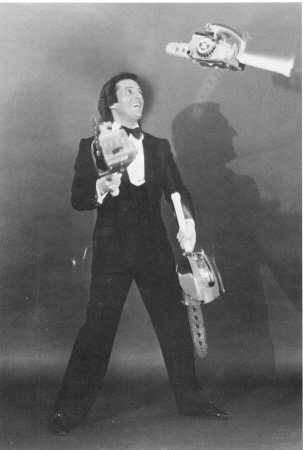 |
Page 6 Summer 1988
|
JW:
Why are you now trying to put more comedy into your act? DF:
So I can last! I'm preparing for the future. You're a fool if you
think you can keep up your technical skill for a lifetime. I don't want
people later down the line to think
they're getting less Dick Franco,
Before it was a race against gravity, Now it's a race against
time.
The
Europeans came to know me during the four years I was there from 1980-84
as a "picture act," a straight juggling act that the
audience looks at, but doesn't touch. That's what you do in Europe, and
that's what the format of the Globetrotters show before that demanded.
JW:
You're saying the European market and American market are
different? DF:
Definitely, and in several ways, Besides preferring the technical
act, the European entertainment directors really know juggling. You'll
walk into their offices and see pictures of all the great jugglers
plastered on the wall. They hire you because they want you, and are
usually willing to pay whatever it takes to get you.
Entertainment
directors in the states want comedy. You break your neck with
technical juggling and they say, "that's nice, but do you eat the
apple?" So, to work here you have to adapt.
It's
impossible to impress an American
What
that means now is that if I want to work in Europe again, I
have to sell myself to those people all over again. They
came to know me as a picture act and are very wary when they
hear that Dick Franco is doing comedy now.
Europe
is nice, but I'd rather live in America. So, I've got to make the
transition to the type of juggling that sells here. I want to do
comedy, but keep the quality
in the act. If I keep all my technical juggling and add comedy,
my 8-minute act is now 25 minutes. But that's OK. It's a challenge and
will help prolong my career. I'm in it for the long run. I don't want
to be 50 years old pretending I'm 30.
Other
people are doing it. Dieter Tasso made a beautiful transition from a
circus act to comedy. And look at Kris Kremo, he's doing a lot more
comedy.
JW:
Were you nervous at the 1979 Circus W orId Championships in England
against Schweitzer and Kremo? What was it about your act that the
judges saw and liked so that they picked you to win it? DF:
I decided to do the performance because I felt it could only help
my reputation to be on the same stage as Kris Kremo and Rudy
Schweitzer. I wouldn't have even done it otherwise. On the night of
the event, we drew lots for our slots in the show. Kris ended up
first, Rudy second, and me third. Kris did boxes, hat and balls, then
Rudy used the same props.
I
came out with totally different props and finished with ping pong
balls, which no one in
None
of us went there to win or lose. But I figured I couldn't lose by just
being in the same forum as these other two great names. Competitively
it was totally inconclusive, but it was a good paycheck and a good way
to sell myself. It couldn't have helped Kremo or Schweitzer at all,
but I was new in
So
I got to ride on Kremo's reputation for one day and ended up earning
years of work out of it. After I won, people were asking, "Who is
this guy who can beat Kremo?" It got everyone's attention and got
me an invitation to the Monte Carlo Circus Festival. Those two
appearances opened the continent of
So
it was luck, but you have to be prepared when these opportunities come
up. Bobby May had told me that to succeed, first you have to be good,
then you have to be lucky! |
 |